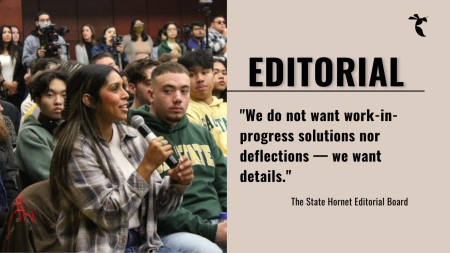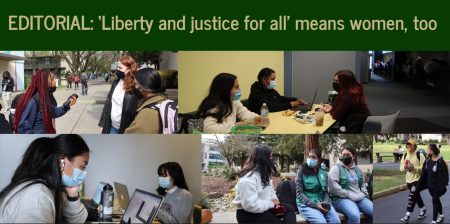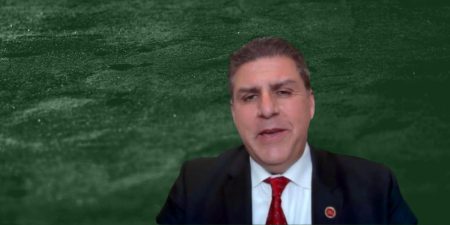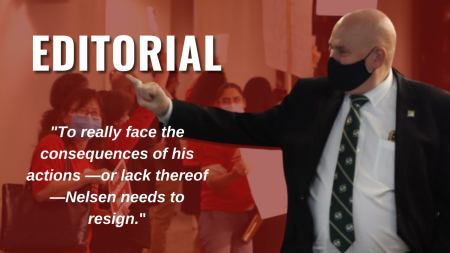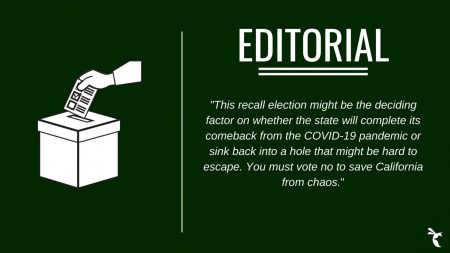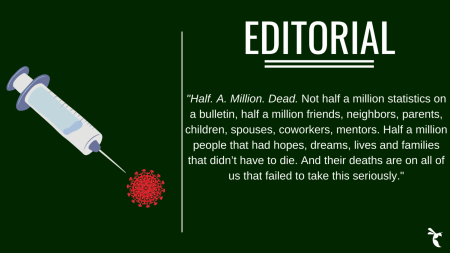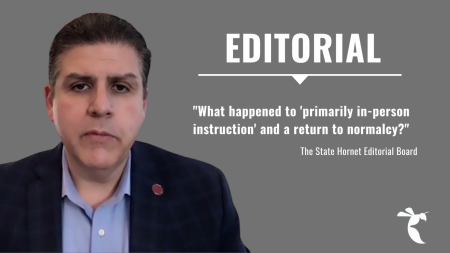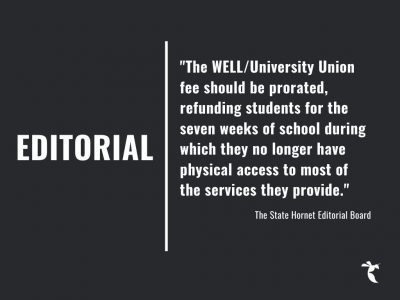EDITORIAL: Cheating cheapens your education
November 17, 2010
Whether or not we like to admit it, most of us have cheated on a quiz, exam, paper or other assignments at one point or another in our academic careers.
Apparently, we tend to do this more often in online classes, where the disconnect between us and the professors is much larger.
Several professors, all of whom teach or have taught an online class at Sacramento State, were asked by the State Hornet about cheating in those classes. Their collective response: Just don’t do it.
In regular classes, at least we can interact with our professors face to face. With online classes, we never really get to know professors on a personal level. If the class does not have a video-streaming feature, we do not even get to see what our professors look like.
Not knowing the person behind the class might make cheating a whole lot easier and make its immorality less apparent.
Samantha Hens, an anthropology professor, said students insult her intelligence when they cheat on written assignments.
Not only is cheating insulting to professors, it also violates the basic trust that should exist between professors and students.
“It disappoints me. It also prompts me to reflect on what I could have done to prevent it,” said Lawrence Chase, communication studies professor.
Feelings aside, there are severe consequences for cheating as laid out in the University Policy Manual &- it is considered a serious offense. Is it really worth it to cheat one time and end up failing the class? The punishments for cheating are the same, regardless of whether you cheat in an online class or in a regular class.
Some professors will simply fail you on a particular assignment, but others will fail you in the class and will report your offense to a student conduct officer. The officer would then decide what type of administrative actions to take in regard to the cheating incident.
“We’re not in high school and it’s not my job to coddle overworked students,” said Liam Murphy, anthropology professor. “I have little sympathy and even less mercy.”
It is really up to you if you want to ruin your reputation or your entire college career with some unnecessary cheating. Just try to devote time to studying instead.
Obviously you are paying for this education. With limited class sections, why keep taking the seat of someone who really wants to learn, and cheapen your whole educational experience?
Besides, professors employ preventive tactics against cheating in an online class and do give you the necessary options, so there is no need to cheat.
Matthew Schmidtlein, geography professor, said he allows students to collaborate and uses the “open-book” approach when it comes to online work.
“I try to reduce the temptation for cheating in online assignments by creating online assignments where students should not need to cheat,” Schmidtlein said.
Tim Croisdale, criminal justice professor, requires students to submit written responses as opposed to multiple choice questions in online work. He can easily tell if two students have the exact same responses from this method. This approach hopes to motivate students to do their own work.
Croisdale also communicates with his students through the “announcement” functions on SacCT and encourages them to do good work.
“I feel that more communication may reduce students’ disengagement in online classes,” he said.
In her classes, Hens requires students to do reading that is not necessarily covered in lecture so as to encourage students to do extra work before taking exams.
Additionally, a simpler method some professors employ in order to prevent students from cheating online is by switching up the questions on exams or quizzes. This way, if two students attempt to take an assessment at the same time, they will not be able to work collaboratively on the exam.
Other professors, like Chase, reserve classrooms for exams if the class was administered entirely online. Students have to bring their ID to these exams; if they live too far away from campus, there is also the option of taking the exam at a local testing center.
So really, there is no need for you to cheat. If you get tempted to cheat to pass an online class, consider the effects it will have on your future academic career.
Professors are people, too. It is a slap in their face if you cheat in their class. Ultimately, it is just not worth it.
The editorial staff can be reached at [email protected].

































































































































